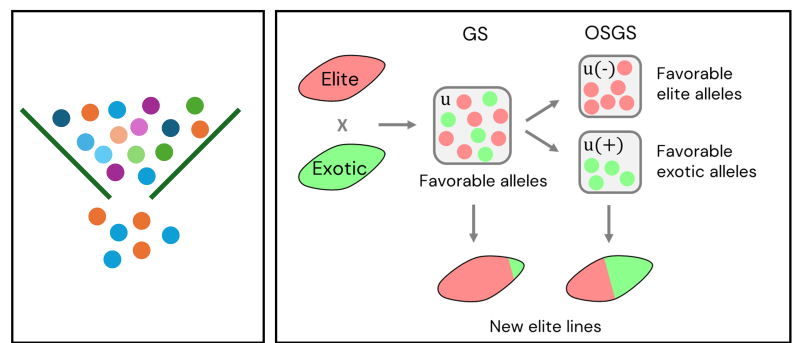Origin Specific Genomic Selection (OSGS)
Genomic selection (GS) or prediction is often used to estimate breeding values for making selection decision in breeding programs. Despite being a fairly well established method, it struggles to perform when there is an effect bias due to parental origins. A common example is in pre-breeding where diverse/exotic lines such as older/unadapted elite, landrace and wild relatives are crossed to elite breeding lines. Even though the exotic lines have novel favorable alleles not present in the elite gene pool, they often have fewer favorable alleles compared to the elite lines. This is not surprising as breeding programs effectively accumulate favorable alleles in their latest elite lines over many generations of selection. Because standard genomic selection approach essentially selects the best alleles indiscriminatively of parental origin, it is bound to reconstitute the elite parental genome. This is simply due to higher probability of selecting alleles from elite origin. So we came up with this idea of partitioning the breeding values according to parental origins so appropriate selection weights can be applied to the elite and exotic breeding values. This is straightforward in biparental cases as we can code for each parent using different sign in genotype coding. For example, in RRBLUP, if we code -1 for elite parent and 1 for exotic parent allele, negative and positive marker effects represent favorable elite and exotic alleles respectively. This is how the name Origin Specific Genomic Selection (OSGS) came about. Using the barley HEB-25 and maize NAM populations, as well as simulated F2 and BC1 populations, we showed in this paper how OSGS can be implemented. For it to be more useful in practice, we really need to extend OSGS to cover multiple parents and traits - I don’t have the time for this anymore but it is worth a revisit.

Left: Simple model showing the loss in genetic diversity due to selection and/or bottleneck. Right: Cartoon showing how OSGS works in contrast to GS.
Publication
Yang CJ, Sharma R, Gorjanc G, Hearne S, Powell W & Mackay I (2020) Origin specific genomic selection: a simple process to optimize the favorable contribution of parents to progeny. G3 10: 2445-2455. [Link]
